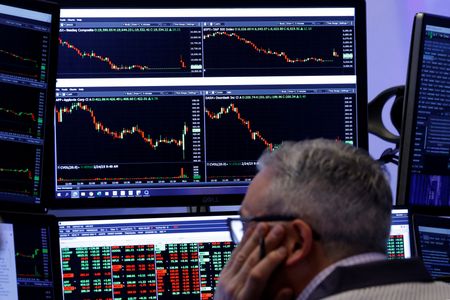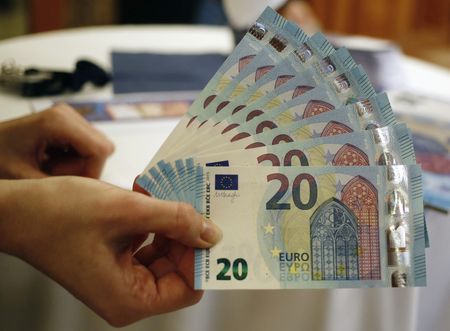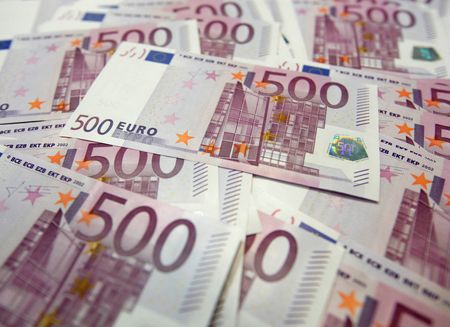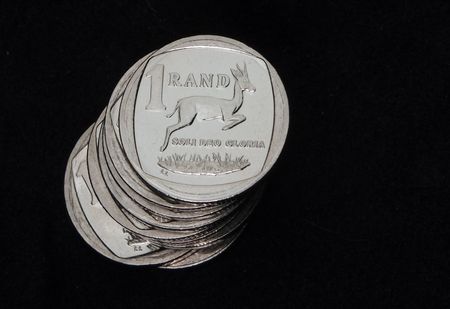By Alden Bentley, Harry Robertson and Wayne Cole
NEW YORK/LONDON/SYDNEY (Reuters) -Wall Street struggled for traction on Monday, ending mixed after slumping last week, while German election results buoyed German shares and Europe’s single currency as investors waited for midweek results from artificial intelligence chip leader Nvidia.
The euro’s positive reaction to Sunday’s conservative election victory in Germany, the currency bloc’s largest economy, capped the dollar.
U.S. stock indexes swapped moderate gains and losses all day, mostly succumbing to more of the same uncertainty about U.S. growth and valuations and geopolitics that helped knock the S&P 500 back from record highs set early last week.
The S&P 500 closed down 0.53% the Nasdaq Composite fell 1.19%. The Dow Jones Industrial Average rose 0.08%.
In recent sessions, weak U.S. retail sales, consumer confidence and services purchasing managers’ reports, combined with higher-than-expected consumer price inflation, have eroded market confidence and, amid uncertainty over a barrage of federal government layoffs, have put U.S. stagflation in center of investor calculations.
“Now we’re looking at other things, whether it’s uncertainty, geopolitical, whether we’re finally looking at earnings and things like that affect markets,” said Joe Saluzzi, co-head of equity trading at Themis Trading.
Saluzzi said investors are distracted by German elections, the war in Ukraine, and a range of other headlines. “People get scared quick,” he said.
U.S. markets opened firmer, taking in a rally in German stocks, along with the euro, which hit a one-month high after German voters put centrist parties on track to form a coalition.
Friedrich Merz was set to become Germany’s next chancellor after his opposition conservatives won the national election. Merz should be able to form a coalition to govern with the ruling centre-left Social Democrats, even though the party came third behind the far-right Alternative for Germany.
“In the end (it was) a result that was close to the latest exit polls and should be a very market-friendly outcome,” said Peter Schaffrik, global macro strategist at RBC Capital Markets.
Germany’s DAX stock index rose 0.62% but the pan-European STOXX 600 index fell 0.08%.
MSCI’s gauge of stocks across the globe fell 0.48%.
The start of German coalition talks comes as EU leaders are set to hold an extraordinary summit on March 6 to discuss additional support for Ukraine and how to pay for European defence needs.
This week marks three years since Russia began its full-scale invasion of Ukraine.
Wall Street took a hit on Friday when a survey on services showed a slide in activity amid concerns about tariffs and cost pressures.
The pullback has raised the stakes for Nvidia’s results on Wednesday when investors will be looking for further rapid growth in revenue and a read on whether AI hype is justified and valuations in market-leading growth stocks fair.
“Markets are already jittery and looking for a reason to take profits,” said Gene Goldman, chief investment officer at Cetera Investment Management, noting that any question about AI is seen as one reason since the technology has driven market growth for the last few years.
The Federal Reserve’s favoured measure of core inflation is due on Friday and expected to show a slowdown to 2.6% from 2.8%, but any impact could be clouded by the focus on Trump’s reliance on import tariffs as a tool for economic policy and leverage over trade partners, which could be inflationary.
Trump’s tariff deadlines on Canada and Mexico are set for next week. Investors also fear the labor market impact from actions taken by billionaire Elon Musk’s Department of Government Efficiency.
A survey of U.S. consumers out on Friday showed inflation expectations for the next five years climbed to 3.5%, the highest since 1995.
The euro rose to a one-month high of $1.0528 before paring to last trade 0.07% higher at $1.0465. The dollar index, which tracks the currency against six peers, was last just above breakeven after being down much of the session.
The U.S. currency rose 0.3% against the yen to 149.75, after sliding last week on the back of rising expectations of further rate hikes from the Bank of Japan.
In commodity markets, gold was up 0.5% at $2,950.80 an ounce, having extended a string of record highs. [GOL/]
Oil has been headed in the other direction, in part on speculation an eventual peace deal on Ukraine could lead to an easing of sanctions on Russia that could boost its fuel exports. [O/R]
Brent rose to $74.78 per barrel, settling up 0.47% on the day. U.S. crude rose 0.43% to settle at $70.70 a barrel.
The yield on benchmark U.S. 10-year note eased 1.8 basis points from late Friday to 4.402%.
(Reporting by Alden Bentley in New York, Harry Robertson in London and Wayne Cole in Sydney; additional reporting by Sinead Carew in New York; Editing by Nick Zieminski and Stephen Coates)











